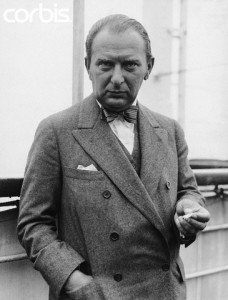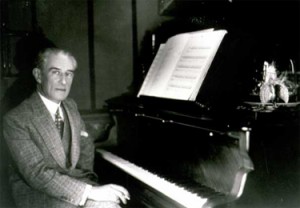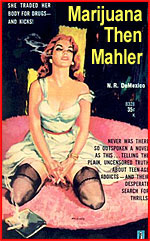As is usually the case when I conduct the research for my pre-concert lectures at the Civic Orchestra, I end up with way more information than I can share in the 30 minutes allotted. Here are some extra insights on the Dec. 8 concert, featuring music of Schumann and Henze. Welcome Civic Orchestra patrons!
Symphony No. 3 (1851)
Robert Schumann (1810-1856)
Confusingly, Schumann’s 3rd Symphony is actually the fourth symphony that he conceived – what we now know as the Symphony No. 4 had been composed a full 10 years earlier; we currently number it fourth because Schumann revised it after completing his 3rd Symphony. Schumann composed the 3rd Symphony as an introduction to his new home of Düsseldorf. It is full of warm spirit, and folk charm.
This is all the more surprising given that Schumann was very cold to his new surroundings and was hardly charmed by the folk. The Board of the Musical Society of Düsseldorf had been very keen to acquire the hot young composer from Dresden, and it was only with significant reluctance that Schumann accepted the post of Music Director.
Certain sights in the Rhineland (for which is Rhenish* symphony is named) did inspire him though. The fourth movement of Schumann’s symphony was inspired by his viewing the Cologne Cathedral, which, as this 1856 photograph clearly shows, was still under construction when he would have seen it:

This cathedral would become the world’s tallest structure from 1880-1884, and it inspired Schumann to compose music that he imagined to be “An Accompaniment to a Solemn Ceremony”.
Symphony No. 3, 4th movement
Schumann did not last long at his post in Düsseldorf, however — it seems that, then as now, a good composer did not necessarily a good conductor make. Apparently Schumann was simply unequipped to bring an orchestra or a chorus up to snuff. Contemporary reports note that he
appeared totally immersed in the score, paying little attention even to the musicians; he lived in the tones.
Schumann became increasingly dissatisfied with his post, noting in his diaries that each rehearsal was “more dreadful” than the last. Musical politics were hardly any better in the 19th century than they are now, and he became particularly paranoid when he read an anonymous review of one of his concerts, “because he suspected the author was a member of the music committee.”
The public themselves didn’t much go in for Schumann’s concerts – they found his programming unfriendly and noted that he was only interested in severe, modern music, i.e. his own, and that of Berlioz, Mendelssohn and Wagner. Audiences today don’t know how good they have it!
Speaking of modern music…
*”Rhenish” has got to be about one of the most delicious words in the English language – particularly because of how much it skews the noun that gave it birth (Rhine).
Symphony No. 8 (1992-3)
Hans Werner Henze (born 1926)

The German-Italian composer Hans Werner Henze was sort of exactly what one expects from a 20th century European musician – scarred by WWII, devoutly Marxist, brazenly homosexual – and his music is a mixture of all this and more.

The central episode of Henze’s life seems to be the major scandal that surrounded the December 1968 première of his oratorio Das Floß der “Medusa” which presented the saga of the Medusa, a ship that had been abandoned by its captain and crew in the early 19th century. Henze (somehow) cast this as a broad political allegory about the life of Che Guevara. So what happened?
The trouble at the first performance … started before a note of the music was heard in the auditorium. Groups of left-wing students showered the audience with leaflets protesting against materialism, the consumer culture and various political causes. A poster of Guevara was put up on the podium, only to be torn down and ripped up by the local director of radio who had organized the concert. The students retaliated by placing a red flag on stage. This provoked complaints form the members of the chorus and an appeal was made to Henze to remove it.
Eventually, people, including the librettist, were beaten and arrested by the police. Apparently 1968 was a tough time to be a classical musician.
Here’s some of what the audience didn’t get to hear that night:
Henze composed his 8th Symphony in the early ’90’s on a commission from the Boston Symphony. It is a highly theatrical work – in fact, the composer took his inspiration from Shakespeare’s A Midsummer Night’s Dream. It is a bit of a lighter work in comparison with it’s immediate predecessor, the Requiem of 1992:
A huge amount of Henze’s extensive output is available on CD, including all of his symphonies up through No. 10 (composed in 2000). You can download much of his music from iTunes here, or you can browse CDs at Amazon here. For those interested in more about Henze’s life, I highly recommend Guy Rickards’ tripartite biography Hindemith, Hartmann and Henze available at amazon.com here.
Feel free to leave a note in the comments section to share your opinions of the concert! Also, feel free to peruse the rest of my site at your own risk, in full awareness that hereafter, the Chicago Symphony/Civic Orchestras have nothing to do with the content on this site…






